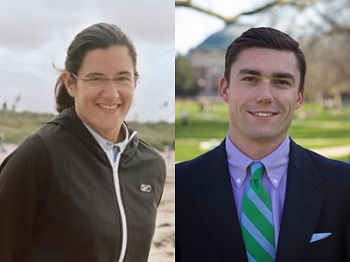
AMERICAN POLITICS & PUBLIC POLICY WORKSHOP - DUAL PRESENTATIONS
The workshop will be hosting dual mini-talks presented by Yale graduate students. Angele Delevoye is a Ph.D. student in political science with research interests in policy-making, social and economic policies, American Politics, and quantitative methods. Collin Schumock is a Ph.D. candidate in political science with research interests in American politics, political institutions, and political economy.
Angele Delevoye: “2020 in America’s School Boards: Deliberation and decision-making in the midst of multiple crises, a field experiment”
Abstract: The project explores what happened in America’s school boards as they dealt with COVID and other crises in 2020. The project includes a field experiment exploring the causal effect of providing information to school boards on their deliberation and decision-making. The lack of resources is often cited as a key barrier preventing school boards from gathering information and evidence, but we do not know if school boards would be receptive to information in the counterfactual world in which they receive it. By providing them with this information, I am hoping to shade light on whether the lack of resources and access is the reason why they do not engage with research - as opposed to other reasons, such as a lack of confidence in evidence or an unwillingness to use it. How receptive are school boards to new information, and to what extent does the degree to which boards engage with the information depend on some key characteristics of their districts, such as size, resources, partisan orientation, composition and mode of selection? The descriptive portion of the project explores what school boards spend time on: do they spend more time on policy, as opposed to administrative or organizational tasks? What kind of policies do they spend most time on? What is the tone and dynamics of these discussions? How has the COVID crisis changed what school board work on, and how they work? What kind of policies were ‘sacrificed’ when school districts had to pivot toward COVID? How much do the answers to these questions depend on some key characteristics of the district?
Collin Schumock: “Legislative Term Limits and Variation in State Transfers”
Abstract: Legislative term limits are one of the key institutional features that differentiate state governments. Myriad claims are made about the effects of term limits on political and policy outcomes. One interesting finding in the literature is that legislative term limits seem to increase state aid to local governments. I investigate a related question: How have legislative term limits affected the variation of state aid to local governments within states? Using a fixed effects model, I find that term limits are associated with an increase in the standard deviation of per capita state intergovernmental transfers to local governments at the county-area level. Variation in transfers within states increased markedly in the years after term limits were passed and implemented. Those states without legislative term limits have seen the variation in their state aid levels remain relatively flat. Considering the importance of state aid to local governments’ budgets, and local governments’ budgets to citizens’ welfare via the provision of governmental services, term limits could be creating unequal circumstances for citizens within the same states. I also consider potential mechanisms driving this relationship including legislator behavior, party control, and lobbying by local governments by first reflecting on work by other scholars and then exploring empirical avenues to probe the potential mechanisms.
This virtual workshop is open to the Yale community. To receive Zoom information, you must subscribe to the American Politics & Public Policy Workshop. Please subscribe at this link: https://csap.yale.edu/american-politics-public-policy-workshop.
